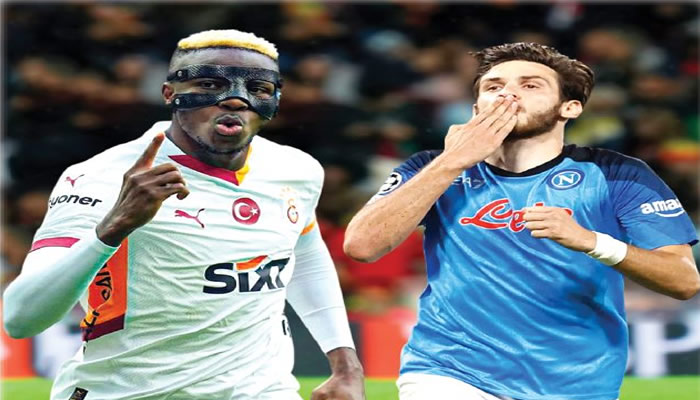The Italian football club Napoli finds itself grappling with a significant financial setback, projected to lose a staggering €70 million due to the depreciated market value of their star players, Victor Osimhen and Khvicha Kvaratskhelia. This substantial loss stems from the club’s decision to hold onto both players during the previous summer transfer window, despite lucrative offers, particularly a combined €200 million bid from Paris Saint-Germain (PSG). The club’s gamble backfired spectacularly as both players’ performances and subsequent market values dipped considerably, leaving Napoli in a precarious financial position and hindering their rebuilding efforts.
Napoli’s predicament revolves around the contrasting fortunes of Osimhen and Kvaratskhelia. Osimhen, the Nigerian striker who spearheaded Napoli’s title-winning campaign with 26 league goals, saw his market value plummet from €120 million to €75 million. His pre-season refusal to participate in friendlies, coupled with a subsequent loan move to Galatasaray in Turkey, albeit a successful one with 13 goals and 5 assists in 16 appearances, further diminished his perceived value. Similarly, Kvaratskhelia, the Georgian winger who arrived at Napoli for a modest €12 million in 2022, experienced a devaluation, with PSG now valuing him at €55 million, a significant drop from his peak valuation.
The club’s failed attempt to retain these key players highlights a series of missteps and miscalculations. Napoli President Aurelio De Laurentiis’s confident declaration in May 2023 that neither player would be leaving proved to be drastically misplaced. The subsequent saga involving Osimhen’s failed move to Chelsea before his eventual loan to Galatasaray, coupled with Kvaratskhelia’s explicitly stated desire to leave the club, further compounded the situation. Manager Antonio Conte’s candid admission of his failure to influence the players’ decisions underscores the internal challenges Napoli faced in managing these high-profile departures.
The financial implications of these failed transfers are profound. The €70 million loss represents a substantial blow to Napoli’s rebuilding plans, especially considering the club’s struggles on the pitch. Finishing 10th in Serie A, cycling through three managers, and missing out on European qualification for the first time in over a decade further emphasize the team’s decline. The loss of revenue from both player sales and European competition exacerbates the financial strain, making it more challenging to secure adequate replacements for their departed stars.
Napoli’s attempts to navigate the fallout have been met with further complications. While they signed Romelu Lukaku and Scott McTominay, these additions have not filled the void left by Osimhen and Kvaratskhelia. PSG’s subsequent offer of €70 million for Kvaratskhelia, potentially involving player exchanges with Milan Skriniar or Marco Asensio, has been rebuffed by Napoli, seemingly determined to avoid a repeat of the protracted transfer saga that marked Osimhen’s departure. This cautious approach reflects the club’s awareness of the potential for further financial losses and reputational damage should they mismanage another high-profile transfer.
In essence, Napoli’s current predicament serves as a cautionary tale in football management. The club’s failure to capitalize on peak market values for their star players, coupled with their inability to retain them or secure adequate replacements, has resulted in a significant financial setback and a decline in sporting performance. The situation underscores the delicate balance between maximizing player value, respecting player ambitions, and maintaining a competitive team. Napoli’s experience serves as a stark reminder of the potential consequences of misjudging the transfer market and the importance of proactive and strategic planning in managing valuable assets.


